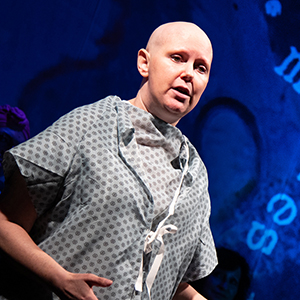-
January 28: The Week in Cancer News
Pharmacies asked to stop turning immune-compromised people away for fourth shot, and fiber intake is associated with stronger immune response in people with melanoma.
by Marci A. Landsmann
-
January 21: The Week in Cancer News
Metastatic cancer patients nearing death continue to receive high-dose radiation despite guidelines advising against it, and new standards are likely to reduce racial disparities in lung cancer screening.
by Kevin McLaughlin
-
January 14: The Week in Cancer News
Cancer mortality continues to go down, and a “real-world” study finds more than a third of active surveillance patients are lost to follow-up.
by Eric Fitzsimmons
-
Cancer, On and Off Stage
Erin Cronican, who has stage IV breast cancer, plays the lead role of a professor diagnosed with metastatic ovarian cancer in the New York City production of Wit.
by Pamela Rafalow Grossman
-
January 7: The Week in Cancer News
Three out of four people with advanced colorectal cancer suffer significant financial hardship, and lung cancer patients who quit smoking experience increased survival.
by Marci A. Landsmann
-
Acknowledging the Stress of Cancer
A patient advocate session at the San Antonio Breast Cancer Symposium offered practical tips for dealing with cancer.
by Marci A. Landsmann
Cancer Talk
Many People Don’t Get Colonoscopy After Receiving Abnormal Blood Tests
About half of people who receive abnormal results from colorectal cancer screening tests don’t follow up with a colonoscopy.
by Laura Gesualdi Gilmore
Can Steroids Impair Immunotherapy for Cancer?A new study suggests steroids could blunt the effects of some immunotherapies, but researchers say they remain necessary for some patients.
by Kyle Bagenstose
Treatment Combination Improves Survival in Platinum-resistant Ovarian CancerPreliminary results found that combining relacorilant with nab-paclitaxel improved outcomes for women with advanced ovarian cancer.
by Sandra Gordon
CAR T-cell Therapy Shows Response in Rare Brain CancerPotential new approach to treating diffuse intrinsic pontine glioma uses engineered immune cells infused directly to the brain.
by Taneia Surles










